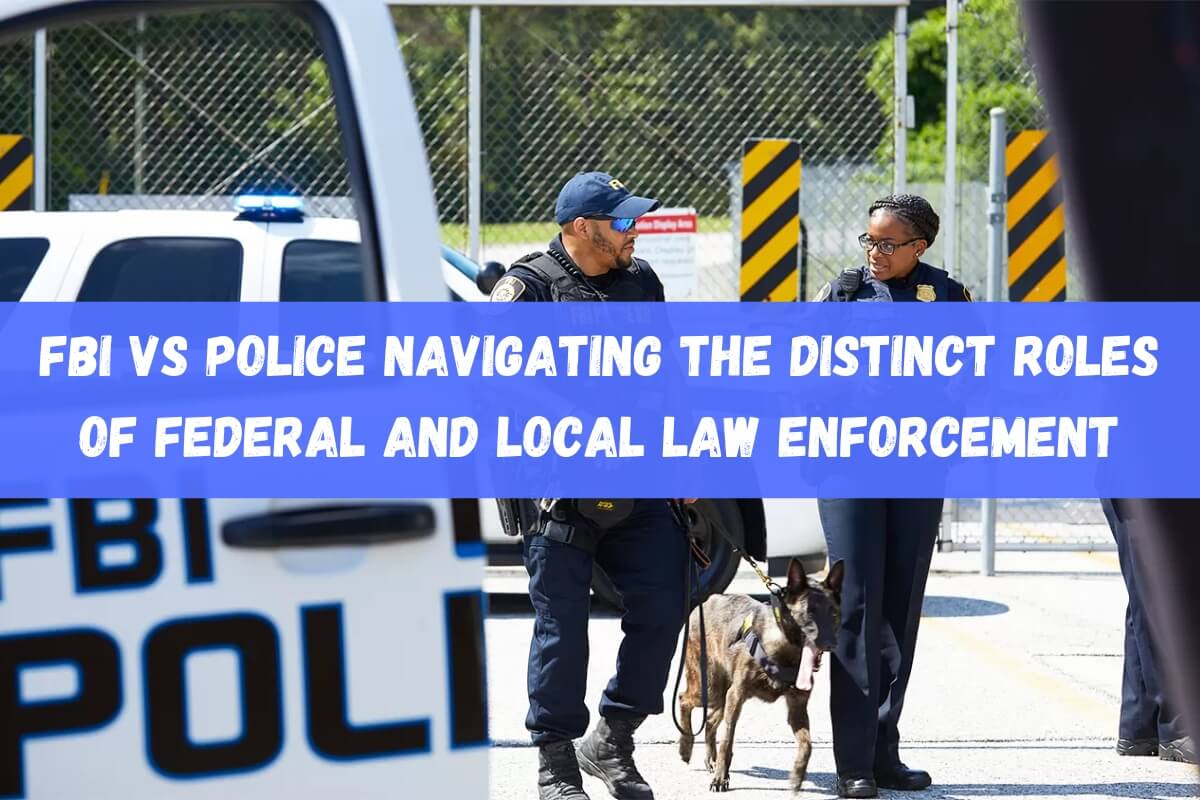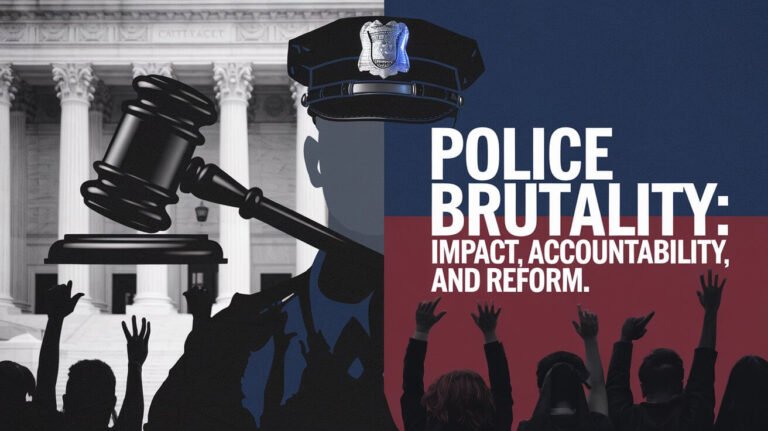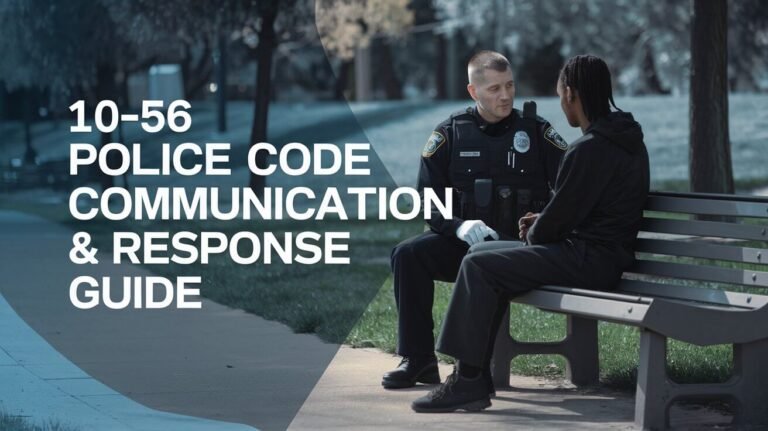FBI vs Police: Navigating the Distinct Roles of Federal and Local Law Enforcement

Law enforcement is critical to maintaining public safety and upholding the rule of law in any society. In the United States, two prominent entities stand out regarding law enforcement: the Federal Bureau of Investigation (FBI) and local/state police departments. While both agencies share the goal of enforcing the law and protecting citizens, their roles, jurisdictions, and responsibilities differ significantly.
So, what’s the difference between the FBI and the police? In essence, the FBI is a federal agency that investigates violations of federal laws and threats to national security, while police officers enforce state and local laws within their respective jurisdictions.
We’ll discuss the roles, training, areas of operation, and teamwork of police officers and sheriff’s deputies. These law enforcement professionals have some key differences. We’ll cover the following aspects:
- What is the FBI, and what do FBI agents do?
- What are the roles and responsibilities of local/state police officers?
- Key differences between the FBI and police in terms of jurisdiction, authority, and types of crimes investigated.
- How the FBI and police collaborate on major cases and investigations.
- Career paths, salaries, and job outlook for FBI agents and police officers.
By understanding the nuances between these two vital law enforcement bodies, you’ll gain a deeper appreciation for their respective roles in maintaining order, combating crime, and safeguarding the nation.
What is the FBI, and What Do FBI Agents Do?
The Federal Bureau of Investigation (FBI) is the principal investigative arm of the United States Department of Justice and serves as both a federal law enforcement agency and a domestic intelligence agency. Established in 1908, the FBI operates at a national level, with field offices located throughout the country.
The FBI’s primary mission is to protect the United States from terrorist attacks, foreign intelligence operations, cyber-based attacks and high-technology crimes, public corruption, and civil rights violations. Unlike local law enforcement agencies, the FBI does not have the authority to enforce state or local laws. However, they often collaborate with state and local police departments to provide expertise and assistance in major investigations.
FBI agents, also known as Special Agents, are highly trained professionals tasked with investigating federal crimes and national security threats. Their responsibilities include:
- Conducting surveillance operations and gathering evidence in criminal investigations.
- Making arrests and testifying in court regarding cases they have worked on.
- Coordinating with local law enforcement agencies and other federal agencies when needed.
- Maintaining files and records related to ongoing investigations.
- Executing search warrants and working with informants to gather intelligence.
- Providing training and expertise to local law enforcement officers.
To become an FBI agent, individuals must meet rigorous requirements, including being between the ages of 23 and 37, possessing a four-year college degree, and having at least two years of professional work experience. Candidates must also pass a comprehensive background investigation, medical and fitness examinations, and a drug test. Successful applicants undergo an intensive 20-week training program at the FBI Academy in Quantico, Virginia, where they receive instruction in law enforcement techniques, firearms proficiency, defensive tactics, and various investigative disciplines.
What Are the Roles and Responsibilities of Local/State Police Officers?
Local and state police officers are law enforcement professionals employed by city, county, or state governments. Their primary role is to enforce state and local laws, maintain public order, and protect the lives and property of citizens within their respective jurisdictions.
The duties and responsibilities of police officers can vary depending on the specific agency and location, but generally include:
- Patrolling assigned areas to deter and respond to criminal activity.
- Conducting traffic stops and enforcing traffic laws.
- Responding to emergency calls and investigating reports of crimes or disturbances.
- Gathering evidence, interviewing witnesses, and making arrests in criminal cases.
- Testifying in court proceedings related to cases they have investigated.
- Participating in community outreach programs and fostering positive relationships with residents.
- Providing assistance and support during natural disasters, civil unrest, or other emergencies.
Police officers may also have the opportunity to specialize in specific areas, such as SWAT (Special Weapons and Tactics) teams, K-9 units, narcotics investigations, or detective work, depending on their agency’s needs and the officer’s qualifications and interests.
The requirements to become a police officer vary by state and agency but typically include obtaining a high school diploma or equivalent, completing training at a certified police academy, passing physical and written examinations, and undergoing background checks. Many agencies also require candidates to possess a certain level of education, such as an associate’s or bachelor’s degree in criminal justice or a related field.
Key Differences Between the FBI and Police
While both the FBI and local/state police forces share the common goal of enforcing the law and maintaining public safety, there are several key differences between these two entities:
Jurisdiction and Authority
The most significant difference lies in their jurisdictional boundaries and authority. The FBI is a federal agency with jurisdiction to enforce federal laws across the entire United States. In contrast, police officers operate within the specific state, county, or municipal jurisdictions that employ them and are primarily responsible for enforcing state and local laws.
Types of Crimes Investigated
Due to their differing jurisdictions, the FBI and police agencies typically investigate different types of crimes. The FBI focuses on investigating federal offenses such as terrorism, cybercrime, public corruption, civil rights violations, and organized crime. Local and state police, on the other hand, primarily handle street crimes, assaults, burglaries, traffic violations, and other offenses that occur within their local communities.
Training and Requirements
The training and requirements for FBI agents and police officers differ significantly. FBI agents undergo a rigorous 20-week training program at the FBI Academy in Quantico, Virginia, and must possess a four-year college degree and several years of professional experience. In contrast, the requirements for police officers vary by agency but generally include completing a certified police academy program and meeting specific educational and physical fitness standards.
Structure and Resources
The FBI is a federal agency with a centralized leadership structure and access to substantial resources and funding. Local and state police departments, on the other hand, operate as individual agencies within their respective jurisdictions, often with limited resources and decentralized command structures.
When Do the FBI and Police Collaborate?
Despite their differences, the FBI and local/state police agencies frequently collaborate on major cases and investigations that require a coordinated effort or specialized resources.
Instances where the FBI and police might work together include:
- Large-scale investigations that cross jurisdictional boundaries or involve multiple agencies.
- Cases involving federal offenses, such as organized crime, terrorism, or public corruption.
- Investigations that require specialized expertise or resources, such as forensic analysis, surveillance capabilities, or intelligence gathering.
In these situations, the FBI may assist local police departments by providing technical assistance, forensic support, intelligence analysis, or by forming joint task forces to pool resources and expertise. Conversely, local police officers may be called upon to assist the FBI in executing search warrants, making arrests, or providing local knowledge and intelligence.
The FBI works with local police departments, but they don’t have direct authority over them. They collaborate to ensure public safety and uphold the law.
FBI vs Police: Salaries and Career Outlook
The salaries and career prospects for FBI agents and police officers can vary depending on factors such as location, experience, and specific agency or department.
FBI Agent Salaries and Career Outlook
According to data from Indeed, the average salary for an FBI agent in 2024 is approximately $106,047 per year. However, salaries can vary based on factors such as experience, position, and location.
FBI agents typically start their careers at the GS-10 or GS-11 pay grade on the federal government’s General Schedule (GS) pay scale. As they gain experience and advance through the ranks, they can progress to higher pay grades, with supervisory and management positions reaching the GS-14 and GS-15 levels.
The career outlook for FBI agents is generally positive, with opportunities for advancement and specialization within the agency. The U.S. Bureau of Labor Statistics projects a 3% growth rate for employment of police and detectives, which includes FBI agents, between 2022 and 2032.
Police Officer Salaries and Career Outlook
According to the Bureau of Labor Statistics, the average annual salary for police officers in the United States is $65,186 in 2024. However, salaries can vary significantly depending on the location, agency, and an officer’s rank and experience.
Entry-level police officers typically earn lower salaries, with the potential for pay increases as they gain experience and advance in rank. Sergeants, lieutenants, and other supervisory positions generally earn higher salaries than patrol officers.
The career outlook for police officers is also positive, with a projected 3% growth rate for employment of police and detectives between 2022 and 2032, which is faster than the average for all occupations. As communities continue to prioritize public safety and law enforcement, demand for qualified police officers is expected to remain steady.
Advancement opportunities within police departments can include promotions to supervisory roles, such as sergeant or lieutenant, or specializing in areas like detective work, SWAT teams, or crime scene investigation. Some officers may also pursue leadership positions, such as becoming a police chief or commissioner.
What’s the Chain of Command?
Both the FBI and local/state police agencies have well-defined hierarchical structures and chains of command to ensure efficient operations and clear lines of authority.
FBI Chain of Command
Within the FBI, the chain of command typically follows this structure:
- Special Agents
- Supervisory Special Agents
- Assistant Directors
- Executive-level positions (Deputy Director, Associate Deputy Director, Executive Assistant Director)
- Director of the FBI (appointed by the President of the United States)
Special Agents are the front-line investigators and law enforcement officers within the FBI. They report to Supervisory Special Agents, who oversee specific cases or units. Assistant Directors manage broad operational divisions, such as counterterrorism or cybercrime. At the top of the hierarchy are the Executive-level positions, including the Director of the FBI, who is responsible for the overall leadership and direction of the agency.
Police Department Chain of Command
The chain of command in local and state police departments can vary slightly, but generally follows a similar structure:
- Police Officers
- Corporals or Sergeants
- Lieutenants
- Captains
- Deputy Chiefs or Commanders
- Assistant Chiefs
- Police Chief or Commissioner
Police officers are the front-line law enforcement personnel, responsible for patrolling, responding to calls, and making arrests. They report to sergeants or corporals, who serve as first-line supervisors. Lieutenants and captains manage specific divisions or precincts, while deputy chiefs or commanders oversee larger operational areas. The police chief or commissioner is the top-ranking official, responsible for the overall leadership and administration of the department.
Clearly defined chains of command are essential for maintaining discipline, accountability, and efficient communication within law enforcement agencies, ensuring that orders and directives are properly executed and that responsibilities are delineated.
High-Profile Cases Handled by FBI vs Police
Throughout their histories, both the FBI and local/state police agencies have been involved in numerous high-profile cases that have captured national attention and demonstrated the importance of their respective roles in law enforcement.
Notable FBI Cases
- The Unabomber Investigation (1978-1995): The FBI’s longest and most costly investigation, which eventually led to the arrest of Theodore Kaczynski, who carried out a series of bombings over nearly two decades.
- The Oklahoma City Bombing (1995): The FBI played a crucial role in investigating the domestic terrorist bombing of the Alfred P. Murrah Federal Building, which claimed 168 lives.
- The Silk Road Investigation (2011-2013): The FBI’s investigation into the online black market known as Silk Road, led to the arrest of its founder, Ross Ulbricht, and the seizure of millions in Bitcoin.
- The Boston Marathon Bombing (2013): The FBI worked closely with local law enforcement agencies to investigate the bombings and track down the perpetrators, brothers Dzhokhar and Tamerlan Tsarnaev.
High-Profile Police Cases
- The O.J. Simpson Murder Case (1994-1995): The Los Angeles Police Department (LAPD) investigation into the murders of Nicole Brown Simpson and Ronald Goldman garnered worldwide attention and sparked debates about police procedures and racial bias.
- The Columbine High School Massacre (1999): Local law enforcement agencies in Jefferson County, Colorado, responded to the tragic school shooting that claimed 13 lives and sparked discussions about school safety and emergency response protocols.
- The Boston Marathon Bombing (2013): While the FBI led the investigation, the Boston Police Department played a crucial role in the initial response and manhunt for the perpetrators.
- The Parkland School Shooting (2018): The Broward County Sheriff’s Office and local police departments faced scrutiny for their response to the mass shooting at Marjory Stoneman Douglas High School, which claimed 17 lives.
These cases highlight the complexity and significance of the work undertaken by both the FBI and local law enforcement agencies, as well as the importance of collaboration and coordination in addressing high-stakes investigations and critical incidents.
Conclusion
The FBI and local/state police forces play distinct yet complementary roles in maintaining public safety and upholding the rule of law in the United States. While the FBI operates at the federal level, investigating crimes and threats to national security, police officers serve as the frontline of law enforcement within their respective communities.
Despite their differences in jurisdiction, authority, and the types of crimes they investigate, the FBI and police agencies often collaborate on major cases that require a coordinated effort or specialized resources. This cooperation is essential for ensuring public safety and effectively addressing complex investigations that span multiple jurisdictions or require diverse expertise.
As our society continues to evolve, the roles and responsibilities of law enforcement agencies will undoubtedly adapt to meet new challenges. However, the fundamental principles of protecting citizens, upholding the law, and maintaining order will remain at the core of their missions.
By understanding the distinct roles and responsibilities of the FBI and police, we can better appreciate the intricate tapestry of law enforcement in the United States and the vital contributions made by these dedicated professionals in safeguarding our communities and preserving the principles of justice and democracy.






